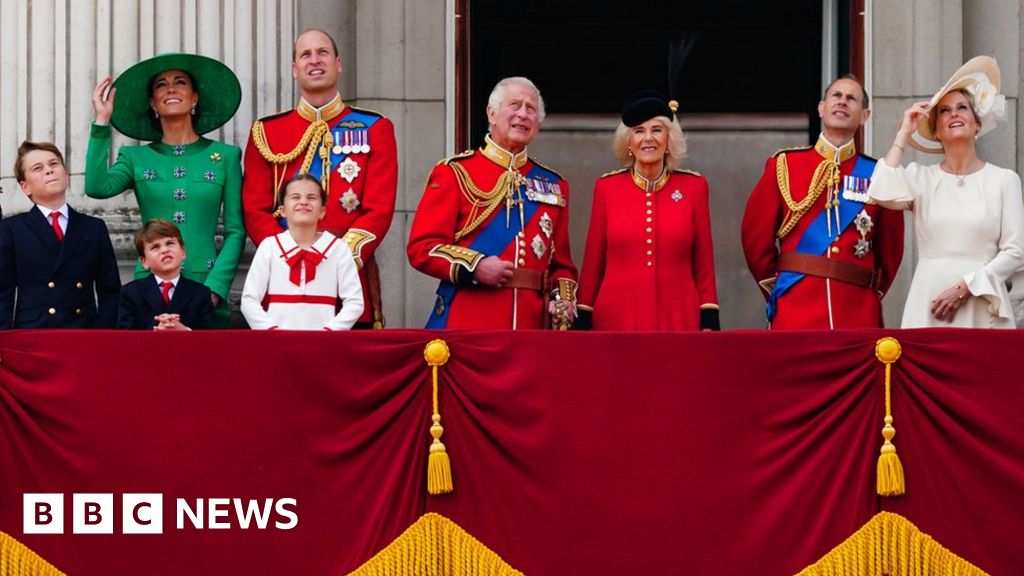- By Sean Coughlan
- Royal correspondent
Researchers examining children’s attitudes towards the monarchy have found more support among Britain’s state schools than in private ones.
The King’s College London study found 66% of children in state schools, aged six to 12, had a positive view of the royals, compared with 56% in private.
Overall it found higher levels of support for the monarchy among children than among teenagers and young adults.
The findings were based on questions for 2,000 pupils across 200 schools.
This study adds another dimension to the extensive research into attitudes towards the monarchy, with polling consistently showing a strong link between age groups and support or opposition to the royals.
The findings on primary school children in England, Scotland and Wales were in “stark contrast” to the views of young adults, said researchers, with a YouGov twice-yearly poll showing that only 27% of 18 to 24-year-olds saw the monarchy as “good for Britain”.
It is not until the over-50 age range where a majority say the monarchy is good for the country, according to the long-running survey, which overall found 52% backing the royals.
But this latest university study has looked at an earlier stage and found a majority of primary school children had a positive response to the monarchy, in terms of making them feel “happy”, “excited” or “proud”.
On average, the study found 65% support for the monarchy from this representative group of primary schools, with the highest levels of 68% in faith schools.
State schools had significantly higher levels of support than independent.
Researchers could not fully explain this difference, but suggested it could reflect a higher level of international pupils in their private school sample, with these children having less of a connection to the British Royal Family.
It could also be a geographical effect, say researchers. As well as age patterns in attitudes towards the monarchy, there are also significant regional differences.
Surveys have consistently shown lower levels of support for the monarchy in London and the researchers say the number of the capital’s private schools in the sample could have influenced the findings.
But the big picture, according to lead researcher Dr George Gross, is to provide a more “nuanced” understanding of how attitudes shift over time.
He says there has been a view that people become more “traditionalist” as they grow older and that is reflected in rising support for the monarchy.
However, he says the latest findings in primary schools show a more complicated picture.
“Our initial poll results certainly challenge the idea or consensus that the monarchy lacks support amongst younger people,” says Dr Gross.
The support among children is closer to the most pro-monarchy age group, which is the over-65s.
Dr Gross says it raises questions into what changes attitudes between the ages of 12 and the 18 to 24-year-old age group.
Royal historian Ed Owens said: “It is once these children hit adulthood that disillusionment with the monarchy starts to set in. The 18-to-24s have never been so sceptical about the benefits of constitutional monarchy.”
The royal author said this should be “set against a deeper disenchantment” about issues facing their generation, such as unaffordable housing and student debt, which he says means young people are rejecting the “political and social status quo”, including the monarchy.
The King’s College study was part of wider research into last year’s Coronation, and it found children were even more positive about that spectacle than about the monarchy.
Dr Gross says it is a reminder of how a monarchy “has to be seen to be believed”, with an event like the Coronation really engaging a young audience.
In separate opinion polling, YouGov found approval ratings for King Charles have increased since he revealed his cancer diagnosis – up from 63% to 66% in a regular survey that asks whether people have positive or negative views about members of the Royal Family.
That also showed a strong age divide, with the over-65 age group twice as likely to have a positive view compared with 18 to 24-year-olds.

William Turner is a seasoned U.K. correspondent with a deep understanding of domestic affairs. With a passion for British politics and culture, he provides insightful analysis and comprehensive coverage of events within the United Kingdom.








